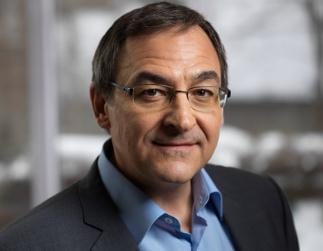Martin Cauchon wants you to know that he sat around the cabinet table in Jean Chrétien’s government. That’s why he mentions it. A lot.
Cauchon, the last entry to the Liberal leadership race, is hanging his hat on having more relevant experience than any other of the eight contestants. And, by all objective metrics, he does.
He consistently points to one achievement as being one of his proudest – legalizing gay marriage.
While Cauchon wasn’t in the House when the civil marriage act was finally passed, he takes credit for slashing through the opposition when he served as justice minister – especially from Chrétien himself. When I ask him about being “the minister probably the most responsible for getting gay marriage passed,” a prideful Cauchon interjects, “I wasn’t the minister probably responsible; I was the minister responsible.”
Cauchon has been tiptoeing around the federal scene for years. He reportedly contemplated, but eventually backed down from, running to replace Stéphane Dion in 2009, and eventually ran in his former seat in 2011 – only to lose to Thomas Mulcair.
Just as in the last election, it seems Cauchon is once again in the wrong race at the wrong time – Justin Trudeau is, by all measures, cruising to victory. Still, Cauchon is hoping that his record and his experience working in rural Canada, especially Quebec, will help him (all 308 ridings have the same voting weight).
Cauchon in his own words:
On gay rights: “We know that the next step is to ensure that we can have full social acceptance of gays and lesbians and transgendered people across Canada. So I believe now it’s a question of education and making sure that people are aware . . . I was very proud a few months ago when one of my sons, who is 14, came back home and said, ‘Dad, we spoke about your bill today in school and I’m so proud of what you have done.'”
On gay rights abroad: “Canada is a model when we talk about same-sex marriage and respect for human rights. So I guess the next stage is to make sure that we can export our human rights.”
On bullying: “Through a national crime-prevention strategy, we can certainly get involved with the provinces in helping [fight bullying] and on a national basis an [anti-bullying] program.”
On decriminalizing drugs: “I believe that in the medium term, cannabis should be decriminalized. There’s no doubt in my mind. [Step one: offer] ‘alternative sentencing’ so that the kids that are arrested for cannabis possession wouldn’t end up having a criminal background. That was step number one, but the ultimate step is that it should be decriminalized. We should be tougher, though, and that was my goal, on people who traffic. And when we talk about cocaine, and all those drugs that we call ‘hard drugs,’ those should remain criminal.”
On sex work: “The law has to be reformed. I remember when Paul Martin kicked me out of my department — this is something that I wanted to do: I wanted to change the existing law, to offer better protection for sex workers.”
On Medicare coverage for sex reassignment surgery: “I see no reason why it shouldn’t be there. To me, it’s no big deal; there’s no reason why it shouldn’t be there.”


 Why you can trust Xtra
Why you can trust Xtra


